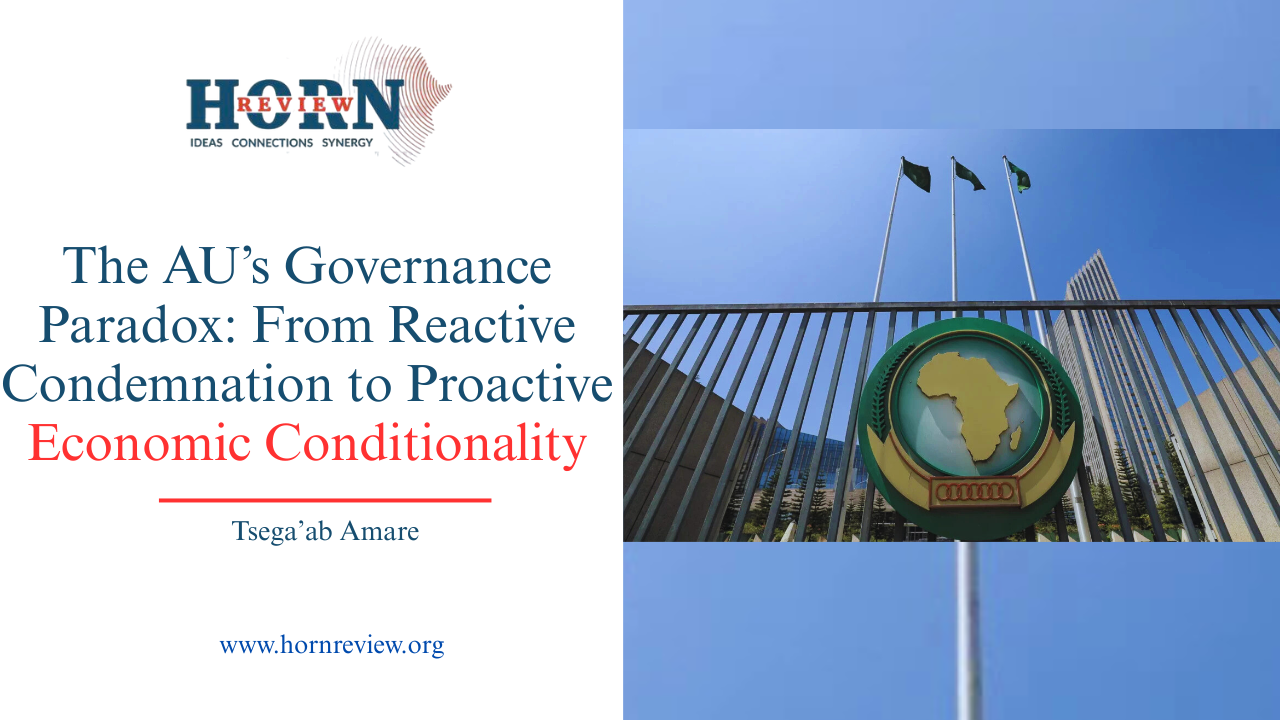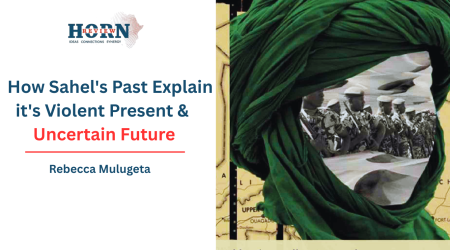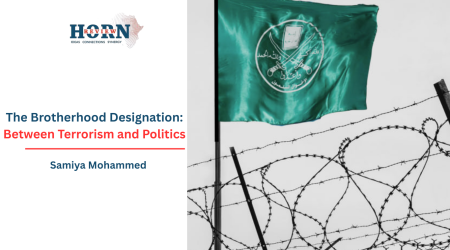
27
Oct
The AU’s Governance Paradox: From Reactive Condemnation to Proactive Economic Conditionality
As military takeovers resurface across Africa, the African Union faces a test of its normative credibility. Moving from reactive condemnation to proactive economic conditionality may hold the key to restoring its democratic authority.
It now stands at a critical moment in its mission to safeguard democracy and constitutional order across the continent. Despite possessing one of the world’s most comprehensive normative frameworks—the Constitutive Act, the Lomé Declaration, and the African Charter on Democracy—the AU remains confined within a pattern of reaction rather than prevention. Its interventions usually appear only after a military coup or constitutional rupture.
The evidence is clear. Since 2020, the continent has experienced a surge of military takeovers stretching from the Sahel to Central Africa, even though the AU’s anti-coup framework is among the most explicit in the world. This paradox reflects a deeper structural weakness: the AU’s political institutions respond only once crises have already consumed legitimacy and governance capacity. By the time the Peace and Security Council (PSC) issues a communiqué, the democratic order has already collapsed or is in the process of collapse. The result is a recurring pattern of delayed reaction, selective enforcement, and worsening humanitarian impact that frequently deepens the instability the Union seeks to prevent.
The crisis in Madagascar illustrates how the reactive posture taken by the AU continues to erode the institution’s credibility. The protest that erupted in September 2025 did not emerge from nowhere; it was the outcome of years of socioeconomic decline, chronic power and water shortages, and widespread frustration with corruption and the rising cost of living. The early warning signs of institutional decay, leading to the youth led protests to spread across cities, were visible to all. However, the AU remained passive until the crisis escalated into a near military takeover.
The PSC convened its 1305th emergency session on October 13, 2025, only after the soldiers joined the demonstrations and an elite unit had declared control over parts of the armed forces. As the crisis had already reached a point of rupture, the condemnation arrived too little, too late. This incident reveals a fundamental institutional weakness of the AU in being unable to detect the early symptoms of governance failure, only its consequences. By waiting for a coup before intervening, the Union forfeits its opportunity to mediate, guide reforms, and/or stabilize civilian governance; thus, every delayed response becomes another case of too little, too late.
Timing is not the AU’s only challenge. Its application of democratic principles remains inconsistent. The pattern is vividly visible in its response to Madagascar and its silence on the repression of youth-led protests in Morocco that started in September 2025, exposing the imbalance. When protesters in Morocco faced police violence and arbitrary arrests, various international actors like the United Nations, Amnesty International, and Human Rights Watch condemned the use of force and called for accountability. The AU, however, did not issue any statement at all.
This silence speaks to a deeper structural bias that prioritizes regime stability over citizen protection; when incumbent governments suppress dissent, the AU’s deference to sovereignty overrides its duty to uphold human rights. The Union thus punishes unconstitutional seizures of power but tolerates unconstitutional practices by those already in power. This asymmetry erodes the legitimacy of its democratic norms and transforms the PSC into an institution that protects governments rather than the governed.
The consequences of such inconsistency are severe. By ignoring the everyday authoritarian drift that often precedes coups, the AU allows corruption, repression, and mismanagement to accumulate until popular revolt becomes inevitable. In effect, the Union’s selective engagement sustains the very instability it claims to oppose.
When the AU finally acts, its chosen tool often does more harm to the ordinary citizens than to the political elites. The standard punitive measure, economic sanctions, has frequently devastated national economies without compelling military regimes to reform. The experience of Sudan, Mali, and Burkina Faso demonstrates this paradox.
Following Sudan’s 2021 military coup, AU sanctions and the suspension of foreign aid contributed to a sharp fiscal contraction. Government revenues collapsed from 10% of GDP in 2022 to below 5% in 2024 amid currency depreciation, rising inflation, and a collapse in exports, severely constraining the state’s provision of essential services. Similar patterns have been recorded in Mali and Burkina Faso, where sanctions, instead of accelerating transitions to civilian rule, worsened inflation and unemployment.
Therefore, sanctions, instead of punishing the perpetrators, often punish the populace while strengthening authoritarian resolve. Historical patterns have shown that military regimes easily convert economic hardship into nationalist rhetoric, portraying themselves as the defenders of sovereignty against external interference. The AU’s punitive model thus undermines its own long-term influence while worsening humanitarian suffering.
From Sanctions to Conditionality
In order to transcend its credibility crisis, the AU must shift from a symbolic punishment to structural leverage. The African Continental Free Trade Area (AfCFTA) offers precisely the kind of material power that the Union’s political architecture lacks. Its Dispute Settlement Body (DSB) already possesses a legal framework that allows for the suspension of trade concessions and other obligations when states violate agreed commitments. If governance conditionality is embedded within this framework, it could transform the AU’s Ability to deter anti-democratic behavior.
Exclusion from the AfCFTA carries tangible economic costs that transcend political suspension, which is largely symbolic. Denying regimes that violate democratic norms access to the world’s largest free trade area, along with its tariff reductions, investment protections, and digital trade benefits, creates a direct disincentive that could pressure them into reform. This approach would act before a coup occurs, by linking access to continental markets and investment flows with measurable governance standards like respect for civil liberties, judicial independence, and transparent management of public resources.
The AfCFTA also provides the procedural strength that the AU’s political organs lack. Its dispute resolution process allows for targeted and reversible measures that can restrict state-owned enterprises or regime-linked investors while protecting private trade and humanitarian goods. This approach transforms sanctions from blunt punishment into precise, proportionate enforcement that pressures ruling elites rather than ordinary citizens.
For this model to function, a new Governance Compliance Protocol (GCP) must be adopted within the AfCFTA framework. The GCP would link adherence to the principles of the African Charter on Democracy, Elections and Governance (ACDEG) with the right to enjoy AfCFTA benefits. It would identify specific indicators of democratic erosion: Systemic rights violations, weakening of judicial independence, and entrenched corruption as triggers for economic review.
The African Peer Review Mechanism and the African Governance Architecture could provide the data required for monitoring compliance. Once a violation is confirmed, the DSB would have the authority to impose targeted restrictions, including the suspension of benefits for state-owned enterprises or the withdrawal of investment protections for government-linked entities. The “reverse consensus” rule within the DSB ensures that such decisions take effect automatically unless unanimously opposed by all members, reducing the risk of political gridlock.
Conditionality must, however, remain equitable. Many African economies vary in resilience, and punitive economic measures risk worsening inequality if applied without care. The DSB should therefore prioritize context-sensitive enforcement that preserves humanitarian trade and social spending while focusing pressure on political and financial elites. This would ensure that accountability does not come at the cost of human welfare.
For this governance-based conditionality to materialize, the full and accelerated implementation of the AfCFTA must first be prioritized. Despite the agreement’s ambitious scope, many member states remain in the early stages of aligning their national trade policies, digital infrastructure, and customs systems with its provisions. Encouragingly, Ethiopia’s recent progress in operationalizing its AfCFTA commitments demonstrates how national commitment can translate the agreement’s principles into tangible outcomes. Without effective institutionalization, the framework will remain a symbolic vision rather than a practical tool of leverage. Strengthening implementation would not only deepen intra-African trade but also provide the AU with the credible economic foundation necessary to enforce governance standards consistently across the continent.
A Blueprint for Proactive Pan-Africanism
The AU’s current challenges do not stem from a lack of vision but from a mismatch between its political ideals and institutional tools. Its founding documents articulate a clear commitment to democracy and human rights, yet its enforcement capacity remains reactive, fragmented, and largely symbolic. The AfCFTA, by contrast, provides a mechanism grounded in material interdependence, enforceable rules, and mutual interest. Integrating governance conditionality into this framework would allow the AU to act preventively, restoring the deterrent power that its political architecture has lost.
Such a transformation would embed democracy within Africa’s economic foundation. It would signal that political legitimacy and economic opportunity are inseparable, and that the benefits of integration are reserved for states that respect their citizens’ rights and constitutional obligations. The combination of political principle and economic incentive would finally allow the AU to move from post-crisis condemnation to genuine prevention.
Africa’s democratic resilience will not be secured through declarations or condemnations alone. It requires the strategic fusion of political commitment and economic power. The AU’s credibility depends on its capacity to act before crises erupt, to use economic interdependence as leverage for accountability, and to design enforcement mechanisms that protect civilians while pressuring elites.
By moving from reactive sanctions to proactive economic conditionality, the AU can fulfill the promise of Pan-Africanism in practice rather than rhetoric. It can demonstrate that sovereignty on the continent is defined not by impunity but by responsibility to the people. Only by aligning its economic power with its democratic principles can the African Union fulfill the Pan-African promise of accountable sovereignty.
The true test of the African Union, then, will not be how often it condemns coups, but whether it can prevent them.
By Tsega’ab Amare, Researcher, Horn Review










